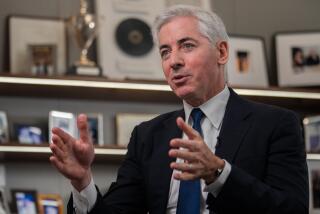Herbalife raises estimate of legal costs amid pyramid allegations
- Share via
Herbalife Ltd. said its feud with billionaire hedge fund manager Bill Ackman has been more costly than it anticipated, prompting speculation that the company is bracing for potential government investigations.
The Los Angeles nutritional products company estimates it will spend $25 million to $40 million this year on legal and advisory fees to defend itself against Ackman’s allegations that the company runs a pyramid scheme in which most of its independent salespeople lose money.
That’s twice as much as the company estimated in February when it said in an earnings release that those costs would be $10 million to $20 million. Herbalife spent $9.5 million in the first three months, the company said in its quarterly financial report recently filed with regulators.
Even for a company the size of Herbalife, which reported $4.1 billion in sales last year, such legal expenses could be painful. If the fees reach $40 million, that would amount to 8% of last year’s $477-million profit.
More troubling, legal experts said, is that the increased estimate in legal fees could be a sign that Herbalife is positioning itself for a regulatory investigation, either from the Securities and Exchange Commission, the Federal Trade Commission or state attorneys general.
“I think the increase is a red flag for the company recognizing that they have additional legal exposure,” said Michael S. Weinstein, a former federal prosecutor who now heads the white-collar defense team at law firm Cole Schotz in Hackensack, N.J.
“That legal exposure could be as a result of either a government investigation or increased litigation resulting from the recent allegations about their business practice,” he said.
Herbalife executives declined to say whether regulatory scrutiny prompted the increased estimate of legal fees.
“We originally underestimated the likely costs,” Herbalife spokeswoman Barbara Henderson said in an email.
“In February, we were very early in the process of building our plan for defending ourselves against the malicious and reckless attack from a short seller. Now, 2 1/2 months later, the plan is better developed and the costs are better understood,” she said.
The controversy erupted in December when Ackman made a presentation — streamed live on the Web — that he said showed that Herbalife operates a pyramid scheme. He said about 90% of the company’s salespeople make no money, while a fortunate few get rich, collecting commissions for recruiting others into the business.
Herbalife denied those allegations. The company uses a multi-level marketing business model, in which its salespeople profit from their own sales, as well as from those they train and recruit into the business.
Herbalife said most of its independent distributors sign up with the company to receive discounts on merchandise they personally consume and do not intend to profit.
After Ackman’s attack in December sent shares spiraling, billionaire investor and Ackman foe Carl Icahn snapped up more than 15% of the company’s shares, driving the stock back up, and picked up two seats on the company’s board of directors.
Another hedge fund manager, Daniel Loeb, also bought a big chunk of the company’s stock. His firm, Third Point, owns more than 8% of Herbalife shares.
In its quarterly report filed Monday with the SEC, Herbalife said it anticipated that government agencies would be asking questions. Earlier this year, the company disclosed that the SEC had inquired about its business model.
“Given the nature of recent allegations made by certain short sellers and related market events, the company believes it may receive governmental inquiries, such as the previously disclosed SEC inquiry,” Herbalife said in the filing.
“To the extent any of these inquiries are or become material they will be disclosed individually,” the filing said. “Consistent with its policies, the company is and will fully cooperate with any inquiries and looks forward to resolving them in a timely manner.”
To reach $40 million on legal fees in a year, a cadre of some 20 expensive lawyers would have to bill 40,000 hours combined.
The expense does not include the costs of defending a lawsuit that a former distributor filed last month in federal court in Los Angeles, Herbalife’s Henderson said. The lawsuit, which seeks class-action status, accuses the company of operating a pyramid scheme.
Herbalife’s increased legal expenses could include an internal review of its business operations as preparation for a potential regulatory inquiry, legal experts said.
“Based on the very public debate about the legitimacy of their business model, it’s not surprising that they would want to devote a lot off resources to this issue,” said Jason Gonzalez, a former federal prosecutor who now handles white-collar defense at Nixon Peabody in Los Angeles.
“The company likely expects to be under a microscope for the foreseeable future,” he said. “It’s not necessarily a sign the SEC or FTC has knocked on their door, but it wouldn’t be a surprise if that were to happen in light of the public scrutiny they’re under.”
Barclays Capital Inc. analyst Brian Wang said the increased legal expense will be at least a short-term drain on earnings.
“I was a little concerned about the increase, just because the estimate had gotten so large,” he said. “I don’t think it says anything about the likelihood for regulatory intervention.”
Ackman, who has bet $1 billion that Herbalife is a pyramid scheme and its shares will fall to zero, declined to comment.
More to Read
Inside the business of entertainment
The Wide Shot brings you news, analysis and insights on everything from streaming wars to production — and what it all means for the future.
You may occasionally receive promotional content from the Los Angeles Times.










